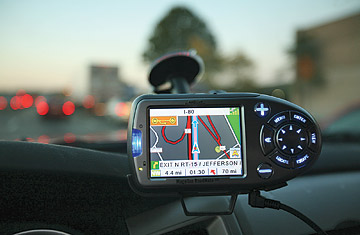
It's the greatest advance in navigation since the compass: the global positioning system (GPS), a constellation of satellites that can pinpoint your location within 10 meters or even less anywhere on the planet. From sea captains to hikers, millions rely on the military-run tool--which explains the alarm that greeted a recent government report warning of "significant challenges" to maintaining the system as a result of delays in upgrading satellites.
Navstar GPS--its formal name--was developed by the Pentagon in the 1970s and relies on a network of 24 satellites orbiting 12,000 miles (19,000 km) above the earth. Radio broadcasts from the satellites include the signals' precise time, determined by an atomic clock, which earthbound receivers use to triangulate their own location. Since the Persian Gulf War, the U.S. military has made extensive use of GPS to move troops and guide high-tech weapons in Iraq and elsewhere. In civilian life, GPS helps everyone from airline pilots to geologists, who use receivers placed along fault lines to study movement during earthquakes. As the devices have shrunk in size and fallen in price, consumer demand has exploded: for many, they're now must-have gadgets for tracking pets or finding fast food on road trips. One research firm projects that the worldwide GPS market will reach $75 billion by 2013.
The Government Accountability Office does not predict the satellite delays will cause GPS to fail. But it warns that precision may decline, which could hamper the military and other demanding users. Air Force Colonel Dave Buckman moved quickly to quell the public's concerns about the system, noting on a military Twitter page that spare satellites are already in place: "GPS isn't falling out of the sky."
